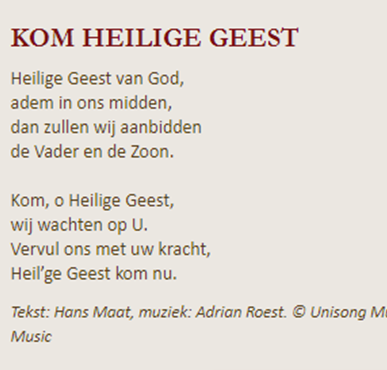‘Baptism in (or with) the Spirit' and 'filling with the Spirit' are two closely related themes in the charismatic movement that you can see as the foundation of their teaching. With this heresy and the accompanying practice you end up in paganism; albeit with a Christian jacket, but still. Charismatic circles continue to build on this foundation and what you can notice is that people are becoming more and more extreme in practice.
It is very important for us to understand where it is wrong and what the biblical meaning is of the expressions 'baptism in the Spirit' and 'filled with the Spirit'.
The 'charismatic way'[1]' begins with unbiblical views about 'the baptism in (or with) the Spirit' and the 'be filled with the Spirit'. Below we ask ourselves what is understood by these concepts in Pentecostal/Charismatic circles and what practice is – in general – associated with them. In addition, we will add some quotes here and there to show how people speak or write about it. Then we have to check whether this corresponds with the meaning of these concepts in the Bible. After all, the underpinning of the concepts and practices is based on certain biblical texts. And the question is whether that is correct.
The big picture
When we want to understand the main line of 'Pentecostalism' (let's just call it that), it comes down to the following. You may have repented to God, accepted the Lord Jesus as your Savior and even been baptized in water. That's nice, but you probably won't notice much of the Holy Spirit afterwards. You long for a life that is 'spirit-filled'; of which you can say that it is noticeable that you as a Christian are full of the Spirit of God.
Then, according to Pentecostal doctrine, you are 'spirit-filled' when you receive 'the baptism in the Spirit', ie when you are immersed in the Spirit. This is a separate event (also called the 'second blessing') that usually takes place when someone (another 'spirit-filled' Christian) lays their hands on you. Then God's Spirit comes over you as a special experience. It is believed that the Spirit of God can be passed on from one person to another in this way.
Not only do you notice this special 'immersion in the Spirit' physically, but it often results in being able to speak 'in tongues' afterwards. To produce sounds incomprehensible to men, but which are said to be understood by God or the angels.
In this way you as a Christian have also received the baptism in the Spirit and you can lead a life filled with the Spirit. You will then also be able to do special, supernatural things for the advancement of God's kingdom.
Nowadays people often use a disclaimer: sometimes someone can also be baptized in the Spirit without the laying on of hands and someone can also be baptized in the Spirit without (being able to) speak in tongues.
A few quotes
Below are a few more or less random quotes from the many that you can find on the internet. If you would check what other Pentecostal/Charismatic pastors say about it, it will perhaps be in the same vein in slightly different words.
Hans Maat (Evangelisch Werkverband of the PKN) says the following about becoming filled with the Holy Spirit (see here):
“At a conference a preacher came up to him, laying on of hands applied. An impressive experience. 'I felt the overwhelming love of God through all my body go.' (…) After the laying on of hands he has the gifts of the Holy Spirit receive.”
David Sörensen puts it this way:
“(…) Jesus Christ wants to give us the miraculous baptism and infilling of the Holy Spirit. The Holy Spirit lifts the Christian life to a completely different level, where God can really meet us and where God a great reality becomes in our daily lives.” (See here).
God has come close now. He lives in us and with us. He wants to fill us with His Spirit. He wants to become a reality for us, which is so beautiful and special that we experience heaven on earth, as it were. With persecution of course, because it remains the earth. But we can come to know God as a reality. His light can shine very strong in us. His love can fill our hearts and guide our actions. His goodness can give us flood and his peace rule us. God's glory is not something we experience much later, when we are dead. No, God is here and now with us and baptize us in his Holy Spirit.
From the booklet 'Dynamic power through the baptism in the Holy Spirit' by Riemer de Graaf (see here) here are a few bits.
“At the baptism in the Spirit, a person, after his conversion and faith in God, voluntarily surrenders, out of his focus on the Word of God, to the Baptist, the Lord Jesus Christ. He baptizes him in the Holy Spirit. The baptized person is, as it were, 'immersed in' and imbued with this Spirit.
In other words: the Spirit of God is fully associated with the spirit of man.
This is how the 'baptism' becomes made one with the Spirit of God and he gets the disposal of his spiritual powers and abilities.
Compare this to John 14:20, where Jesus says, “Then you will understand that I am in my Father, that you are in Me, and that I am in you.” Unity with God is a fact!”
and
“(…) God, as a sign of the becoming one of the Holy Spirit with your (human) spirit, has a spiritual sign given in the sense-perceptible world: speaking languages who are inspired by the Spirit.
(…) Being able to speak spiritual languages is therefore the sign of the baptism in the Holy Spirit! (bold in original)(…) The baptism in the Holy Spirit can be received 'by means of' or by laying on of hands: in the book of Acts we see this happen a few times.”
What we may notice is, for example:
- the laying on of hands is used in many cases. It is believed that in this way the Spirit of God can be transmitted
- you can apparently experience the Spirit physically. What one experiences physically is ascribed to the Spirit of God, completely disregarding the possibility of 'another spirit'. You can experience warmth, light, peace and more in your body
- outwardly visible in most cases is that you can 'speak in tongues'. I didn't include that in Sorensen's quote, but his site has an extensive article about tongues.
- people use a lot of biblical language, often also good formulations, which, however, are given a different content, making it very misleading.
Baptism in the Spirit – according to the Bible
The expression 'baptism in the Spirit' occurs only once in the New Testament, in 1 Corinthians 12:13. If you read the context in chapter 12, it appears that it is about the church, the body of Christ (12:27), in which the Spirit of God distributes gifts to the members for what is useful (12:7). Through the baptism in the Holy Spirit, we are baptized into one body.
When a man turns to God and accepts the Lord Jesus Christ as his Saviour, God puts His Holy Spirit into that man's heart. “(…) in Him you also, when you believed, were sealed with the Holy Spirit of promise (…)” Ephesians 1:13. With the sealing God says, as it were: 'You are now My property'. But at the same time, receiving the Holy Spirit is a baptism in or with the Spirit, in the sense that the born-again man is thereby incorporated into the body of Christ, the Church. So it says here: “For we also were all baptized into one body by one Spirit, whether we be Jews or Greeks, whether slaves or free; and we are all drenched in one Spirit.” 1 Corinthians 12:13.
So they are two aspects of the same event;
- receiving the Holy Spirit is God's gift to the (then) believing man personally, so that God's Spirit dwells in you and will lead you into the knowledge of Him. It is God's seal that you are His property forever.
- Because you get the Holy Spirit indwelling, you are at that moment connected by that same Spirit with the Lord Jesus Christ, but also with all those other believers – brothers and sisters – who have received the same new life through the Spirit. You have thus become one of the many members of the body of Christ. Read more about the Holy Spirit (here and here).
Paul calls the believers never to reach for this baptism in the Holy Ghost for the simple reason that that baptism has already taken place at the new birth. The baptism of the Holy Spirit coincides with the new birth and the Bible offers no room to separate these things. Therefore, what the Charismatic movement teaches regarding the baptism in the Spirit is an unbiblical view and clear heresy, which we must guard against.

Filled with the Spirit – according to the Bible
In line with the misconception about 'the baptism of the Spirit' is a misconception about being 'filled with the Spirit'. In the Pentecostal view this means that you experience the supernatural workings and powers of the Spirit in your life. When asked "Do you want to be filled with the Spirit?" every Christian will say a resounding yes; that's not the problem. But the problem begins when you have to determine its meaning. Or in other words: what is being filled with the Spirit and how do you recognize it? What are the characteristics?
Let's see what the Bible says about being "filled with the Spirit."
“(…) And be not drunken with wine, wherein is debauchery, but be filled with the Spirit (…)”
Ephesians 5:18
Self-control – In control or not?
To begin with, the text indicates a contradiction. When you have had too much to drink and are 'under the influence', there is no self-control anymore. Debauchery arises; you lose control of yourself. You are also no longer able to use your mind and act accordingly. You just let it happen.
But when a person is full of the Spirit, it is completely different: then self-control is an important characteristic see also Galatians 5:22. Then you can use your mind and you are 'in control' yourself. That is the contrast indicated in Ephesians 5:18. This contradiction comes at the end of a section that begins with the warning against being deceived by fancy words without substance (verse 6) and not to dwell on those who teach these things. It is about the choice between darkness – where the devil is in charge – or light – where the Lord Jesus is in charge. That is also the choice between 'being drunk' or 'being filled with the Spirit'.
The Fruit of the Spirit
Furthermore, the broader context of Ephesians 5:18 provides a concrete picture of what we may see as the results of being "filled with the Spirit." It is what verse 9 calls 'the fruit of the Spirit', described as “all goodness and justice and truth”. It is the same fruit described in Galatians 5:22 as “(…) love, joy, peace, patience, kindness, goodness, faith, meekness, self-control”. All these qualities mentioned are fruit of the Spirit, the result of a 'spirit-filled life'.
It begins in Ephesians 5 with love. The love of God and of Christ for us and Christ's sacrifice of Himself as the greatest evidence of that love. That is the starting point and basis for a 'spirit-filled life'. After all, the love of God is the ground for our love in return for Him and for Christ. As John puts it:We love God because He first loved us” (1 John 4:19). The Holy Spirit pours out the love of God in our hearts when we are born again (Romans 5:5) and that has tremendous consequences. Also read for that here and here.
The love of God and the work of Christ cause God's Spirit to produce praise in our hearts. Then we sing that praise, not only personally, but also with the believers.
"(...) and speak among yourselves with psalms, hymns and spiritual songs, and sing to the Lord and praise [Him] in your hearts, and always give thanks for all things to God and the Father in the name of our Lord Jesus Christus”.
Ephesians 5:19,20
After all, submission is a practical consequence of being filled with the Spirit.
“Be subject to one another in the fear of God”
Ephesians 5:21
The willingness to submit and be humble is in line with our attitude toward God, which should be characterized by "fear of God" and wrought in the heart by the Holy Spirit. In verse 21 submission is presented as the characteristic attitude of all believers towards each other. Then (5:22 – 6:9) this is worked out in specific relationships between husband and wife, parents and children and employee and employer. We will not go further into that here.
If you would summarize it very briefly, the believer's being filled with the Spirit is visible in a loving relationship with God and His Word and in a relationship of mutual submission to the brothers and sisters.
How do you become filled with the Spirit?
The expression 'be filled with the Spirit' is actually a command and assumes that I can do something to become filled with the Spirit. But – with reverence – what are 'the knobs' to turn? The charismatic view is that you have to undergo 'the baptism of the Spirit' for that. But the Bible teaches us otherwise.
One who is truly born again "must" do two things that are directly related to God and His Word and require the activity of the Holy Spirit. Those are
- begin by offering sacrifices of praise and thanksgiving to God the Father and to the Lord Jesus Christ. It is the first thing our God desires and pleasing to Him (Ephesians 5:10). we have there elsewhere already written extensively.
- The second is to be busy with the Word of God, because the working of the Spirit of God is also necessary for this. The love of the word of God is an inseparable part of the love of God that has been poured out in our hearts through the Holy Spirit who has been given to us (Romans 5:5). In this way we also become 'full of the word of Christ' with the same results as being full of the Spirit (compare Colossians 3:16 with Ephesians 5:19).
These are the things we cannot do without the working of the indwelling Spirit of God. In fact, that's why we got the Holy Spirit. It is remarkable that in this we therefore have our own responsibility and own initiative to do these things, whereby the Holy Spirit assists us and works in our hearts. In this way the Lord God can fill us with His Spirit, while we ourselves fulfill the commission to be filled with the Spirit.
As an aside, it is not the case that in Christian meetings we should sing songs asking the Holy Spirit to fill us. Unfortunately, in the evangelical Netherlands there are many songs (especially in Opwekking) that call on or encourage the Holy Spirit to fill us, or at least to be 'experienced', such as the song below.


By now it will be clear that this song is unbiblical. But not only that. When people think that this is a biblical song and that God's Spirit works that way and they do desire an experience of the Spirit, then there is 'another spirit' ready to bring about an experience in man.
Finally a few more things
Union with God
By the way, what surprises me the most and I honestly didn't expect it, in the quotes, are the remarks about oneness with God. Here it is simply stated that on the occasion of the 'baptism in the Spirit' the believer is made one with the Spirit of God and from that moment on receives special spiritual powers and gifts. No biblical substantiation is given for this; And no wonder, because there isn't one either. This supposed 'union with God' is the same pagan aspiration as we have encountered in contemplation in 'mystical union'. See for example here and here).
How do you read the Acts?
It is striking that the wrong teaching is mainly based on texts and events in the book of Acts (and the Gospels). One reads the accounts of the various events in the Acts and takes them one-on-one to the here and now. From that they derive a 'doctrine of the Holy Spirit' while forgetting that the Acts is not a 'textbook', but a 'history book'. The Acts gives the account of the formation of the Church of the Lord Jesus Christ and shows how God creates something new and how that new one – the Christian congregation – is completely different from both the Jewish religion and the pagan religions. In addition, in that early stage God often works in a special way to show His confirmation on top of the work of the apostles.
That is why there are many things wrong with the interpretation and application of concepts such as 'baptism in the Spirit', 'laying on of hands', 'speaking in tongues' and 'miracles and signs'. For more extensive argumentation, you can visit the pages indicated below.
- For 'baptism in the Spirit' at here, here and here.
- For speaking in languages here
- For the 'end of the miracle gifts' see here and here.
- About 'impartation' (transferring the Spirit/spirit) you can here and here still reading.
Charismatic vs Biblical
When we compare the charismatic views with the biblical teachings, you get something like the following.
| Charismatic | Biblical | |
| Baptism in the Spirit | Separate event after conversion and rebirth | Not a separate event. At the new birth one receives the Holy Spirit and is incorporated into the church of Christ. This last aspect is what the Bible calls 'the baptism in the Spirit'. |
| hands-on | Basically needed to work the transference of the Spirit. Apparently in some cases it can be done without the laying on of hands. | Laying on hands is absolutely unnecessary. When a person repents and accepts the Lord Jesus, he receives the Holy Spirit from God. No human action is required. The Bible even warns to be very careful about the laying on of hands. |
| Effects | Special 'supernatural' expressions, such as tongues, 'falling into the Spirit'. | A person receives the Holy Spirit and as a result loves God and His Word, as well as fellow believers ("all who are born of God"). This will become apparent in the Christian life thereafter. |
| Filled with the Spirit | Able to do/experience special 'supernatural' things such as 'speaking in tongues', visions, 'prophesying', healings, miracles, etc | A life and submission to God and His Word in human relations, especially in the Church and the family. |
| Experience | Physical experience of the spiritual, heavenly life (life 'in the Spirit') is necessary and the basis for a healthy Christian life. | Faith in and obedience to God's Word are necessary for a healthy spiritual life. The physical experience of God and the divine things is not part of this. |
In view of this, one might say that the main feature of the charismatic doctrine of the Spirit is 'experienced' is, while the biblical teaching is mainly 'believe' (and faith obedience) as its most important characteristic. Or as someone wrote about the charismatic: 'Then one does not believe, then one experiences the supernatural'.
A pagan initiation ritual
The charismatic doctrine (you can also say: the Pentecostal doctrine) does not resemble what the Bible teaches at all. But it's not just about 'learn', it's also about practice and that's where things go badly wrong.
That charismatic practice of accessing the experience of the supernatural is suspiciously like the pagan practice of initiation into a pagan religion. After all, at the initiations to themysteries' (the pagan mystery religions of antiquity) it was an experience of the supernatural, the invisible spiritual world. Through what he experienced, the person who was initiated gained new courage for this earthly life, but also and above all an experience of the wonderful condition of life after this life. At least, that's how it was experienced.
It goes too far to dwell extensively here on the pagan religions[2], but Paul knew that the Gentiles were in contact with the demons when he writes:what the heathen sacrifice, they sacrifice it to demons' (1 Corinthians 10:20).
The Charismatic'baptism in the Spirit' is such an initiation ritual in which the baptized person is brought into contact with the invisible world of the gods/demons. In fact, it is a pagan initiation ritual dressed in a Christian guise. That Christians are unknowingly sent into the path of pagan idolatry is a terrible thing and extremely shocking.
Get out
The Pentecostal movement arose around 1900, (see for example here) has spread in waves around the world and her ideas are now entering all churches and communities. It is sad to see that, unfortunately, this is an ongoing process in which Christian communities are effectively being drawn into ('Christian') paganism. on Lucepedia (from Tilburg University) the following is stated: “After the Roman Catholic Church, Pentecostalism is the largest Christian movement worldwide with approximately 600 million followers”. How incredibly sad it is that Christendom today is dominated worldwide by these two schools of thought, which are called 'Christian', but are actually pagan and idolatrous.
Therefore, the call is made to all of us who love the Lord Jesus Christ and want to follow Him, to separate ourselves from these things (see, for example, here), lest we perish with this apostate Christianity.
“Therefore depart from among them, and be separate, saith the Lord, and touch not the unclean thing..."
2 Corinthians 6:14-18
God's promise, but also His new call is:
“I will receive you, and will be a Father to you, and you shall be My sons and daughters, says the Lord Almighty.
Since then, beloved, we have these promises, let us cleanse ourselves from all defilement of flesh and spirit, and accomplish sanctification in the fear of God”
2 Corinthians 6:17 – 7:1
[1] We mainly use the word charismatic here, but we also mean the 'Pentecostal movement'. After all, in principle they stand for the same conceptions of infilling and baptism with the Spirit.
[2] It would be too much for me to spend a lot of time on this, but in an interesting book from 1927 on mysteries and initiations I have put some quotes on this appendix for those who want to know more about it.
Click here to download document:
